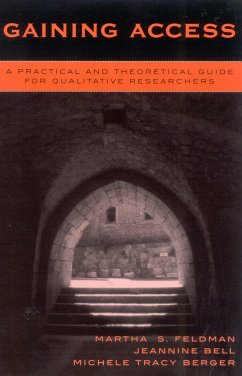Martha S Feldman, Jeannine Bell, Michele Tracy Berger
Gaining Access
A Practical and Theoretical Guide for Qualitative Researchers
Martha S Feldman, Jeannine Bell, Michele Tracy Berger
Gaining Access
A Practical and Theoretical Guide for Qualitative Researchers
- Gebundenes Buch
- Merkliste
- Auf die Merkliste
- Bewerten Bewerten
- Teilen
- Produkt teilen
- Produkterinnerung
- Produkterinnerung
A textbook on gaining access to field settings for qualitative researchers in the social sciences. Prescriptive advice and a series of vignettes from actual research projects.
Andere Kunden interessierten sich auch für
![Quantitative Social Science Quantitative Social Science]() Kosuke ImaiQuantitative Social Science120,99 €
Kosuke ImaiQuantitative Social Science120,99 €![Translation and Culture Translation and Culture]() Translation and Culture105,99 €
Translation and Culture105,99 €![Scaling Impact Scaling Impact]() Robert McleanScaling Impact172,99 €
Robert McleanScaling Impact172,99 €![Public Spaces, Private Lives Public Spaces, Private Lives]() Henry A GirouxPublic Spaces, Private Lives21,99 €
Henry A GirouxPublic Spaces, Private Lives21,99 €![Science, Society, and Values Science, Society, and Values]() Sal RestivoScience, Society, and Values113,99 €
Sal RestivoScience, Society, and Values113,99 €![Theory and Progress in Social Science Theory and Progress in Social Science]() James B. RuleTheory and Progress in Social Science102,99 €
James B. RuleTheory and Progress in Social Science102,99 €![The Cambridge Companion to Malcolm X The Cambridge Companion to Malcolm X]() The Cambridge Companion to Malcolm X109,99 €
The Cambridge Companion to Malcolm X109,99 €-
-
-
A textbook on gaining access to field settings for qualitative researchers in the social sciences. Prescriptive advice and a series of vignettes from actual research projects.
Hinweis: Dieser Artikel kann nur an eine deutsche Lieferadresse ausgeliefert werden.
Hinweis: Dieser Artikel kann nur an eine deutsche Lieferadresse ausgeliefert werden.
Produktdetails
- Produktdetails
- Verlag: Altamira Press
- Seitenzahl: 192
- Erscheinungstermin: 1. Januar 2003
- Englisch
- Abmessung: 229mm x 155mm x 18mm
- Gewicht: 386g
- ISBN-13: 9780759102156
- ISBN-10: 0759102155
- Artikelnr.: 21298894
- Herstellerkennzeichnung
- Libri GmbH
- Europaallee 1
- 36244 Bad Hersfeld
- gpsr@libri.de
- Verlag: Altamira Press
- Seitenzahl: 192
- Erscheinungstermin: 1. Januar 2003
- Englisch
- Abmessung: 229mm x 155mm x 18mm
- Gewicht: 386g
- ISBN-13: 9780759102156
- ISBN-10: 0759102155
- Artikelnr.: 21298894
- Herstellerkennzeichnung
- Libri GmbH
- Europaallee 1
- 36244 Bad Hersfeld
- gpsr@libri.de
Martha S. Feldman is associate dean of the Ford School of Public Policy and professor of political science and public policy. Jeannine Bell teaches at the Indiana University Law School. Michele Berger is a political scientist at University of North Carolina, Chapel Hill.
Part 1 Introduction Part 2 Part One Part 3 Chapter One: Finding Informants
Part 4 Chapter Two: Human Subjects and Permission to Contact Informants
Part 5 Chapter Three: Making Initial Contact Part 6 Chapter Four:
Developing Rapport Part 7 Chapter Five: Exiting: Ending the Relationship
Part 8 Part Two Part 9 Chapter Six: Gaining Access to Individuals Chapter
10 Maintaining Access Chapter 11 Chinese Officials as Ordinary Respondents
Chapter 12 Dealing With Difficult Gatekeepers, Vulnerable Populations and
'Hooks' That Go Awry: An Access Story Chapter 13 Gaining Access: Courting
Minorities in Postwar Bosnia Part 14 Chapter Seven: Gaining Access for
Interviewing Chapter 15 Accessing Business, Government, and
Non-Governmental Organization Actors in Mexico and Brazil Chapter 16
Rendering Unto Caesar: Access to Local Religious Leaders Chapter 17
Breaking into the Bank: The Challenge of Gaining Meaningful Access to the
World Bank Chapter 18 Help From Unexpected Places: Access and
Assistance From Within an Organization Part 19 Chapter Eight: Gaining
Access for Interviewing and Observation Chapter 20 Going to Prison Chapter
21 How I Got Them to Talk to Me: The Importance of Persistence,
Personality, and Identity Chapter 22 Accessing Multiple Human Service
Organizations for Field-Based Research Part 23 Chapter Nine: Gaining Access
for Extended Observation Chapter 24 Studying Work Groups in Indian, China,
and Hungary Chapter 25 Accessing Architects in the Auto Industry Chapter 26
Access to Rivera: Entering and Exiting an Urban High School Chapter 27
Crossing that Yellow Line: Obtaining Access to the Police Departments Part
28 Chapter Ten: Gaining Access for Participation Chapter 29 Perseverance
Furthers Chapter 30 Inside DOE Chapter 31 Access as Relating: On the
Relationship Aspects of Different Types of Access Chapter 32 Access and
Participation in a Government Agency Part 33 Index Part 34 About the
Authors
Part 4 Chapter Two: Human Subjects and Permission to Contact Informants
Part 5 Chapter Three: Making Initial Contact Part 6 Chapter Four:
Developing Rapport Part 7 Chapter Five: Exiting: Ending the Relationship
Part 8 Part Two Part 9 Chapter Six: Gaining Access to Individuals Chapter
10 Maintaining Access Chapter 11 Chinese Officials as Ordinary Respondents
Chapter 12 Dealing With Difficult Gatekeepers, Vulnerable Populations and
'Hooks' That Go Awry: An Access Story Chapter 13 Gaining Access: Courting
Minorities in Postwar Bosnia Part 14 Chapter Seven: Gaining Access for
Interviewing Chapter 15 Accessing Business, Government, and
Non-Governmental Organization Actors in Mexico and Brazil Chapter 16
Rendering Unto Caesar: Access to Local Religious Leaders Chapter 17
Breaking into the Bank: The Challenge of Gaining Meaningful Access to the
World Bank Chapter 18 Help From Unexpected Places: Access and
Assistance From Within an Organization Part 19 Chapter Eight: Gaining
Access for Interviewing and Observation Chapter 20 Going to Prison Chapter
21 How I Got Them to Talk to Me: The Importance of Persistence,
Personality, and Identity Chapter 22 Accessing Multiple Human Service
Organizations for Field-Based Research Part 23 Chapter Nine: Gaining Access
for Extended Observation Chapter 24 Studying Work Groups in Indian, China,
and Hungary Chapter 25 Accessing Architects in the Auto Industry Chapter 26
Access to Rivera: Entering and Exiting an Urban High School Chapter 27
Crossing that Yellow Line: Obtaining Access to the Police Departments Part
28 Chapter Ten: Gaining Access for Participation Chapter 29 Perseverance
Furthers Chapter 30 Inside DOE Chapter 31 Access as Relating: On the
Relationship Aspects of Different Types of Access Chapter 32 Access and
Participation in a Government Agency Part 33 Index Part 34 About the
Authors
Part 1 Introduction Part 2 Part One Part 3 Chapter One: Finding Informants
Part 4 Chapter Two: Human Subjects and Permission to Contact Informants
Part 5 Chapter Three: Making Initial Contact Part 6 Chapter Four:
Developing Rapport Part 7 Chapter Five: Exiting: Ending the Relationship
Part 8 Part Two Part 9 Chapter Six: Gaining Access to Individuals Chapter
10 Maintaining Access Chapter 11 Chinese Officials as Ordinary Respondents
Chapter 12 Dealing With Difficult Gatekeepers, Vulnerable Populations and
'Hooks' That Go Awry: An Access Story Chapter 13 Gaining Access: Courting
Minorities in Postwar Bosnia Part 14 Chapter Seven: Gaining Access for
Interviewing Chapter 15 Accessing Business, Government, and
Non-Governmental Organization Actors in Mexico and Brazil Chapter 16
Rendering Unto Caesar: Access to Local Religious Leaders Chapter 17
Breaking into the Bank: The Challenge of Gaining Meaningful Access to the
World Bank Chapter 18 Help From Unexpected Places: Access and
Assistance From Within an Organization Part 19 Chapter Eight: Gaining
Access for Interviewing and Observation Chapter 20 Going to Prison Chapter
21 How I Got Them to Talk to Me: The Importance of Persistence,
Personality, and Identity Chapter 22 Accessing Multiple Human Service
Organizations for Field-Based Research Part 23 Chapter Nine: Gaining Access
for Extended Observation Chapter 24 Studying Work Groups in Indian, China,
and Hungary Chapter 25 Accessing Architects in the Auto Industry Chapter 26
Access to Rivera: Entering and Exiting an Urban High School Chapter 27
Crossing that Yellow Line: Obtaining Access to the Police Departments Part
28 Chapter Ten: Gaining Access for Participation Chapter 29 Perseverance
Furthers Chapter 30 Inside DOE Chapter 31 Access as Relating: On the
Relationship Aspects of Different Types of Access Chapter 32 Access and
Participation in a Government Agency Part 33 Index Part 34 About the
Authors
Part 4 Chapter Two: Human Subjects and Permission to Contact Informants
Part 5 Chapter Three: Making Initial Contact Part 6 Chapter Four:
Developing Rapport Part 7 Chapter Five: Exiting: Ending the Relationship
Part 8 Part Two Part 9 Chapter Six: Gaining Access to Individuals Chapter
10 Maintaining Access Chapter 11 Chinese Officials as Ordinary Respondents
Chapter 12 Dealing With Difficult Gatekeepers, Vulnerable Populations and
'Hooks' That Go Awry: An Access Story Chapter 13 Gaining Access: Courting
Minorities in Postwar Bosnia Part 14 Chapter Seven: Gaining Access for
Interviewing Chapter 15 Accessing Business, Government, and
Non-Governmental Organization Actors in Mexico and Brazil Chapter 16
Rendering Unto Caesar: Access to Local Religious Leaders Chapter 17
Breaking into the Bank: The Challenge of Gaining Meaningful Access to the
World Bank Chapter 18 Help From Unexpected Places: Access and
Assistance From Within an Organization Part 19 Chapter Eight: Gaining
Access for Interviewing and Observation Chapter 20 Going to Prison Chapter
21 How I Got Them to Talk to Me: The Importance of Persistence,
Personality, and Identity Chapter 22 Accessing Multiple Human Service
Organizations for Field-Based Research Part 23 Chapter Nine: Gaining Access
for Extended Observation Chapter 24 Studying Work Groups in Indian, China,
and Hungary Chapter 25 Accessing Architects in the Auto Industry Chapter 26
Access to Rivera: Entering and Exiting an Urban High School Chapter 27
Crossing that Yellow Line: Obtaining Access to the Police Departments Part
28 Chapter Ten: Gaining Access for Participation Chapter 29 Perseverance
Furthers Chapter 30 Inside DOE Chapter 31 Access as Relating: On the
Relationship Aspects of Different Types of Access Chapter 32 Access and
Participation in a Government Agency Part 33 Index Part 34 About the
Authors








